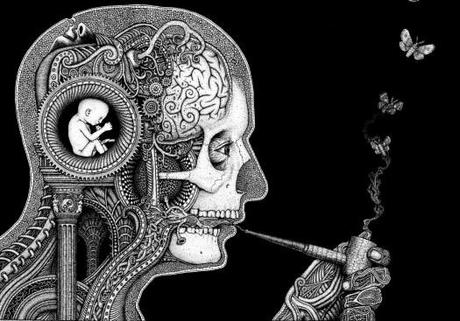The person who lives inside your head may seem rational and honest, but who is fooling who? If you are fortunate there is only one voice and if you are sober the voice should be sensible. Or so we would like to think. Two recent studies suggest otherwise. As it turns out, our homunculi are unrealistic optimists and veritable liars.

While this may sound calamitous, it isn’t. There are good evolutionary reasons for lying to ourselves and being cheerful about it.
In “The Evolution and Psychology of Self-Deception,” psychologist William von Hippel and anthropologist Robert Trivers turn conventional “know thyself” wisdom on its proverbial head by arguing that self-deception evolved so that we can effortlessly tell lies without getting caught. Although they don’t come right out and say it, their premise is that (a) everyone lies and (b) lying can be beneficial. Lying, in other words, should not categorically be condemned a priori as bad, sinful, or unwarranted. It’s not hard to imagine circumstances in which lying is beneficial and indeed right or moral. Any such thought exercise should begin with the righteous lies told to Nazis looking for Jews.
While lying to someone else without being caught is of obvious utility when the price of detection is death, von Hippel and Trivers are more interested in the lies we tell ourselves:
There are many ways to deceive other people. An obvious choice is to tell an outright lie, but it is also possible to deceive others by avoiding the truth, obfuscating the truth, exaggerating the truth, or casting doubt on the truth. Just as these processes are useful in deceiving others, they can also be useful in deceiving the self. For example, if I can deceive you by avoiding a critical piece of information, then it stands to reason that I can deceive myself in the same manner.
Just as telling an outright lie is more difficult than fudging the truth or withholding information, it is also difficult to tell ourselves outright lies. For the lies we tell ourselves to be effective, we must believe what our homunculi are telling us. How do we manage? By biasing our information search strategies, offering fanciful interpretations, and selectively recalling memories. If we are really good at this, we believe. If we aren’t so good, we rationalize.
Regardless of which deceptive strategy we use or the result it entails, von Hipple and Trivers find one constant: “What marks all of these varieties of self-deception is that people favor welcome over unwelcome information in a manner that reflects their goals or motivations.” If such goals and motivations are fitness enhancing, that is they enable survival and reproduction, then it is easy to see how believing or rationalizing our self-told and self-made lies is beneficial or adaptive. It may also explain Nietzsche’s observation that false judgments and untruths are necessary conditions of life.
Our homunculi are not just good liars; they are also cheerful optimists. Puzzled by the fact that most people are optimistic and remain so even in the face of bad news or contrary evidence, Tali Sharot and colleagues recently studied how the brain manages this tricky business.Their conclusion: the part of our brain that codes for errors or contradictions doesn’t work so well when the update information is negative and the consequence would be lowered expectations or pessimism. Incredibly, this difference applies only to those who were classified as having “high optimism” before the testing and not to those who had “low optimism.” Both high and low optimists track and code desirable information equally well.
Congenital optimists, in other words, have homunculi that wear rose colored glasses. These glasses filter out negative information or contradictory evidence and distort probabilities. Realistic Bayesians these homunculi are not. As the study authors note, this may be a good thing:
Underestimating susceptibility to negative events can serve an adaptive function by enhancing explorative behavior and reducing stress and anxiety associated with negative expectations. This is consistent with the observation that mild depression is related to unbiased estimation of future outcomes and severe depression to pessimistic expectations. However, any advantage arising out of unrealistic optimism is likely to come at a cost.
As an example of such a cost, the authors cite the unrealistic assessment of financial risk leading to the 2008 economic collapse. There is another cost and it is the ultimate casualty: truth. But perhaps this is just my bias.
What both these studies show is that we are very good at deceiving ourselves and once we have arrived at a conclusion, no matter how unwarranted, changing our minds can be difficult. While this may be depressing for some, for unrealistic optimists it won’t matter.
References:
von Hippel, W., & Trivers, R. (2011). The evolution and psychology of self-deception Behavioral and Brain Sciences, 34 (01), 1-16 DOI: 10.1017/S0140525X10001354
Sharot, T., Korn, C., & Dolan, R. (2011). How unrealistic optimism is maintained in the face of reality Nature Neuroscience, 14 (11), 1475-1479 DOI: 10.1038/nn.2949


